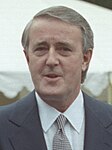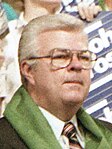| |||||||||||||||||||||||||
| |||||||||||||||||||||||||
| |||||||||||||||||||||||||
| Date | June 11, 1983 |
|---|---|
| Convention | Ottawa Civic Centre,[1] Ottawa, Ontario |
| Resigning leader | Joe Clark |
| Won by | Brian Mulroney |
| Ballots | 4 |
| Candidates | 7 |
| Entrance Fee | C$5,000[2] |
| Spending limit | None |
The 1983 Progressive Conservative leadership election was held on June 11, 1983, in Ottawa, Ontario to elect a leader of the Progressive Conservative Party of Canada (PC Party). At the convention, Montreal businessman and lawyer Brian Mulroney was elected leader on the fourth ballot, defeating former prime minister and party leader Joe Clark.
Joe Clark became party leader in 1976 and led the PCs to a minority government in the 1979 federal election, though lost power only nine months later. In 1981, about a third of delegates were dissatisfied with Clark's leadership and were in favour of holding a new leadership convention. Clark refused to resign as leader and stayed on, though in January 1983 still about a third of delegates were unhappy with Clark's leadership. Clark resigned as leader, triggering a leadership election. If he won, he would have been able to demonstrate a 'clear mandate' to the opponents of his leadership.
A big tent party, a politically diverse set of eight candidates ran for the leadership. President of the Iron Ore Company of Canada Brian Mulroney, along with former Bay Street investment executive Michael Wilson and sports owner Peter Pocklington, gained support among the pro-business faction of the party. Clark and former Mayor of Toronto David Crombie were popular among Red Tories while Member of Parliament John Crosbie was popular among the social liberal wing of the PC Party. John A. Gamble and Neil Fraser were lesser-known minor candidates who only had a few followers. Quebec played a major role in the leadership election, as Crosbie and Wilson's chances of victory were hampered by their inability to speak French. Mulroney, on the other hand, was a fluently bilingual native Quebecer who was popular among PC members from Quebec.
After the results of the first round were released, the set of eight candidates was halved to four; Wilson and Pocklington endorsed Mulroney while Gamble and Fraser endorsed Crosbie. In the second round, Crombie was eliminated and endorsed Crosbie. Crosbie, Mulroney and Clark were the three candidates left standing in the third round, and Clark was the only one in the trio who never received an endorsement. After Crosbie placed third, he released his delegates to vote as they chose. In the fourth round, Mulroney was elected leader with 54.4% of the votes cast compared to Clark's 45.6%.
Mulroney later went on to carry the Progressive Conservatives to a massive landslide victory in the 1984 federal election, and a second majority government in 1988. Clark, Crosbie, Crombie and Wilson would all gain prominent positions in Mulroney's cabinet.
- ^ "NOTEBOOK: Even washroom stalls no refuge from the convention's paper blitz". Globe and Mail. June 11, 1983.
- ^ Martin, Gregg, Perlin, p. 156.
© MMXXIII Rich X Search. We shall prevail. All rights reserved. Rich X Search



